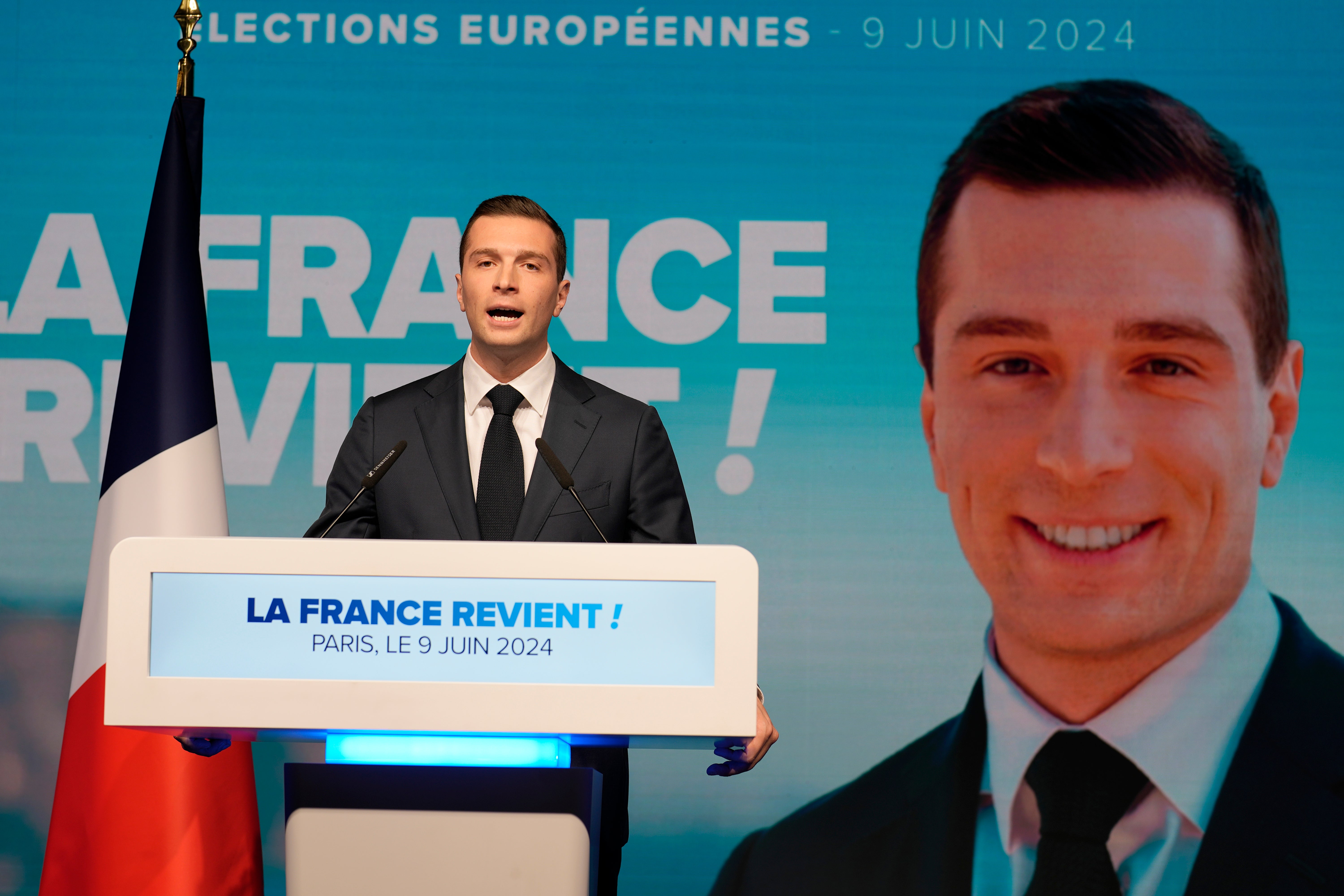AfD’s win in Germany is another sign its young men driving the rise of the far right across Europe
As Germany’s far right party AfD celebrates its first win in a state parliament election since World War Two, Georgios Samaras follows the march of the far right across Europe from Greece’s Spartan party to France’s National Rally– and its growing sinister appeal to young voters

On 9 June, Jordan Bardella, leader of France’s far-right National Rally, addressed an enthusiastic and jubilant audience with remarkable composure and confidence. A sea of young faces stood cheering, waving flags and soaking in his every word. At 28, Bardella, a Frenchman of Italian descent (his maternal family immigrated to France in the 1960s), gave an impassioned speech underscoring the party’s commitment to closed borders. In the wake of the European Union election result which saw his party secure over 31.4 per cent of the vote and 30 seats in the European parliament, its success, he said, heralded “a new hope” for France.
It was enough to jolt Emmanuel Macron into swift action. Despite having three years left of his presidential term he called a shock snap election. His was a different hope. A hope, he said, that “when the time comes, men and women of goodwill who will say no to extremes will come together”.
This turned out to be a clever tactical move and France’s far-right National Rally lost out to a hastily built left-wing coalition, but what is certain is Bardella’s leadership seems to have played no insignificant part in propelling his party’s popularity. In the space of a few days, he had become the poster child of how the far right has captured the hearts and minds of a new generation. And as Germany’s anti-immigration Alternative for Germany (AfD) celebrates a “historic success” with its first win in a state parliament election since World War Two, it is clear that a new mood is building across Europe and it is the young who are driving it.

The AfD’s gains were especially large among young voters. According to initial reports, in Thuringia the party finished first with 37 percent support among 18- to 24-year-olds, an increase of almost 20 percentage points compared to its result in the previous state election in 2019. Historian Enzo Traverso’s 2018 book The New Faces of Fascism aimed to shed light on the evolving demographics of the Europe-wide movement. His initial observations seem prescient today: young men aligning with a modernised far right which seeks to mask its ideological extremism and present a less menacing facade.
Bardella typifies this as a young male politician whose rhetoric around racial purity, xenophobia, and an ultranationalist “France-first” vision for his country, chimes with a young population who feel disillusioned and underserved. Traverso asked whether this phenomenon constitutes a new form of fascism, one that can be characterised as a terrorist movement with aspirations of European domination. I believe it is now safe to agree with this assessment.
The footprints of this kind of radicalisation among the young in Europe were visible over a decade ago. My research into the now-convicted and defunct neo-Nazi party Golden Dawn in Greece gave a first hint at what was coming. Economically challenged and socially deprived, a lack of trust in mainstream parties drove a significant portion of young Greek voters to lurch to the far right.
From the chaos of “Grexit” which preceded Brexit in 2015 and never came to pass, but shook the country to its core nevertheless, emerged the far-right nationalist party Golden Dawn.
Between 2020 and 2021, I spoke to many young men aged 18-40. Men like Lefteris* who was drawn to the appeal of the movement’s leader Nikolaos Michaloliakos and his rhetoric of national pride. He, like many of the men I met, believed that only Golden Dawn could rescue the nation from “moral collapse”. The way they talked was sincere but deeply unsettling to any student of the rise of Nazi Germany.
The young men I interviewed had been drawn to Golden Dawn’s emphasis on masculinity and its strong national values resonated with them. They were indifferent to the party’s neo-Nazi affiliations and the involvement of some members and MPs in criminal activity which linked them to the murders of two young left-wing activists. Some even dismissed these incidents as conspiracy theories, despite the party being found guilty of operating a criminal organisation in 2020, resulting in the imprisonment of seven of its leaders.

By 2023, a spin-off of Golden Dawn emerged under a new alias. To the surprise of many, the Spartans party, which put candidates forward just two weeks before the June general election, captured enough votes to win 12 seats in the Greek parliament.
The majority of its supporters were male, with over 16 per cent of Greeks aged 16-44 casting their ballots in its favour. Many pointed to the notions of ultranationalism and white purity and the party’s appeal to a youth who felt like they weren’t being offered any other solutions to their problems.
Revelations that a former MP of Golden Dawn, Ilias Kasidiaris, had orchestrated the party’s affairs from prison, aiming to resurrect a neo-Nazi criminal organisation within the Greek parliament, mean that the party has subsequently been banned. However, the reasons behind this pull to the extreme right linger everywhere.

In Germany, in 2019 only 5 per cent of the youth vote supported the far-right Alternative fur Deutschland (AfD); however, in the EU election, that figure surged to 16 per cent despite the party’s alleged involvement of its members in neo-Nazi activities. AfD state leader of Thuringia, Björn Höcke, is considered one of the most radical representatives of his party. He has repeatedly used Nazi rhetoric and was found guilty in court twice in 2024 alone for using a banned Nazi slogan at his campaign events.
The handful of ex-servicemen gathering on the beaches of Normandy for this year’s 80-year D-Day commemorations was a poignant reminder of how the living memory of the fight against fascism is fading. What is emerging in its place is a picture of young adults, often college-educated, embracing the beliefs that so many of their grandparent’s generation gave their lives fighting against.
Nearly 40 per cent of voters aged 18-24 in France and 20 per cent of the same demographic in Spain cast their ballots for the far right. Portugal too has witnessed a surge for the far right, represented in the Chega (“Enough!”) party with the support of many young voters establishing it as the country’s third-largest party.
The rise of the Reform party in the UK also shows how far-right thinking is shaping mainstream politics in a very real way. Could Reform influence the future of conservatism in the UK as some are suggesting? Will it matter that, as was reported by The Times in June, close to one in 10 candidates for Nigel Farage’s party in England were “friends” on Facebook with Gary Raikes, a former organiser for the British National Party? Raikes founded the New British Union in the image of Oswald Mosley’s British Union of Fascists, with a horde of young male activists calling themselves “Blackshirts” behind him. According to Professor Paula Surridge, deputy director of the UK in a Changing Europe think tank, men aged 25 or under were more likely than those in their forties and fifties to consider voting for Reform.

This appeal to the young may be due to far-right parties becoming highly adept at communicating their messages through polished graphics and meticulously curated content. AfD consciously targeted young voters on Tik Tok with simple and emotional messages around loss of identity that are easy to understand. With over a million followers on TikTok, Bardella consciously avoids overt extremist symbolism or language. TikTok videos aren’t about policy discussion, they are about creating a vibe or feeling that resonates; through this, the parties set out their “stall”.
And we can see how effective this shift right can be in the beaming face of Italian prime minister Giorgia Meloni as she hosted the G7 in Puglia earlier this year. Her party – the far-right Brothers of Italy – was handed a convincing win in the recent European elections and, unlike many Western European leaders, she was emboldened not shaken by the vote.
Sources in Brussels suggested that Meloni now sees herself as the European kingmaker, touting herself as the future face of the centre-right. While such claims are audacious and downright chilling, the blame shouldn’t fall on young voters for choosing Meloni but rather on a panicky centre-right for embracing ideas that contradict its own principles of liberal conservatism and so normalising extreme views for a new generation.

For years, the far right has employed fearmongering tactics to propagate dangerous conspiracy theories, such as the alleged replacement of the white population by Muslims or the denial of climate change. In an attempt to stem the flow of supporters to far-right parties, centre-right factions have adopted this rhetoric and blurred ideological distinctions as they do so.
Now dubbed the “culture wars”, once far-right agendas now permeate the mainstream and the public begins to prioritise these issues over other policy-related concerns and efforts to address critical issues facing communities.
Far-right leaders across Europe now seem ready to influence public policy significantly, having secured over 20 per cent of the seats in the European parliament. The new mood after the EU elections in June vividly illustrated by celebratory gatherings observed in Germany, France, and Italy. A close colleague of mine based in Germany noted that Europe now feels unsettlingly similar to the 1930s.
While this might be an overstatement, the rise of the far right does share disturbing similarities with the pre-Second World War era, including its focus on migration, gender issues, and other societal debates. And while far-right parties may be being stopped from gaining absolute power by coalitions, their grass root popularity shows just how close a far-right “golden dawn” could be for young men looking to leaders offering a terrifying new vision of “hope”.
*Name has been changed
Georgios Samaras is an assistant professor of public policy at Kings College London and author of ‘Opening the Floodgates of Hate: An Investigation into Golden Dawn’s Online Extremism’





Join our commenting forum
Join thought-provoking conversations, follow other Independent readers and see their replies
Comments